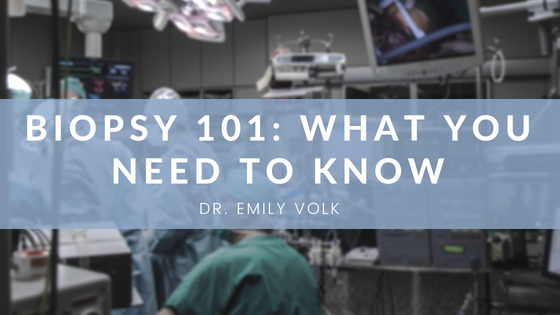There is an abundance of medical jargon that gets thrown about around patients. These technical terms often don’t do much more than confuse patients, which can result in more tension because of the uncertainty. This adds an extra layer to my job, as finding the most accessible way to explain information, which I have learned in a detailed and professional setting over an abundance of training and educating, to a patient becomes an actively exercised skill.
One term in particular that seems to strike a nerve in a lot of patients is “biopsy.” The word is foreign to many mouths; it doesn’t even sound like any word people use on a normal day-to-day basis! So how do we break down these terms into bite sized pieces? Let’s take a closer look.
What is a biopsy?
A biopsy is a procedure done where a doctor takes a sample of bodily tissue from a patient so they may examine it up close in more detail to see if there are any notable abnormalities that need attention. This sort of procedure is often recommended to a patient who has any indication of abnormal tissue, which can mean a variety of things, from benign tumors to cirrhosis.
How should I prepare?
Depending on the type of biopsy you are receiving, there are a number of things you as a patient can do to ensure your procedure goes smoothly. The first is confirming what kind of biopsy it is: if you are getting an entire mass removed, it is referred to as an excisional biopsy, in which case, your doctor might ask you to find someone to drive you home after the procedure or to avoid medications that can increase the risk of bleeding during or post procedure.
The other types of biopsies you might hear your doctor mention are incisional or core biopsies, which are less invasive than an excisional biopsy, as they only seek to remove a sample of the tissue under suspicion. In most situations in regards to this procedure, your doctor will place you under local anesthesia, which is also something to always take into consideration before your operation.There is also always the risk for infection or blood clots, so ensuring you’re doing everything on your end to prevent such issues from occurring is also of paramount concern.
What’s next?
After receiving a procedure, it is important to remain in conversation with your doctor about any changes, fluctuations, regression, or progress you see post-operation. Your doctor is sure to appreciate your transparency with them throughout the process. In addition to their appreciation of transparency, an open line for communication can ensure you are receiving the attention and care you need for your situation.
It is of utmost importance to feel comfortable around your doctor and to avoid keeping them in the dark, especially when it comes to a procedure like a biopsy. Talk to your doctor today, and work on creating a safe environment and secure relationship with them before your next procedure.
